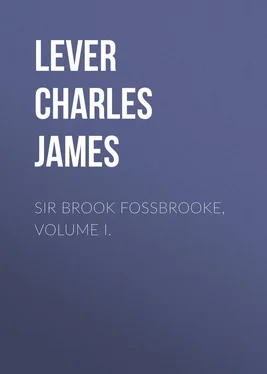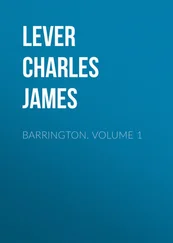Charles Lever - Sir Brook Fossbrooke, Volume I.
Здесь есть возможность читать онлайн «Charles Lever - Sir Brook Fossbrooke, Volume I.» — ознакомительный отрывок электронной книги совершенно бесплатно, а после прочтения отрывка купить полную версию. В некоторых случаях можно слушать аудио, скачать через торрент в формате fb2 и присутствует краткое содержание. Жанр: literature_19, foreign_antique, foreign_prose, на английском языке. Описание произведения, (предисловие) а так же отзывы посетителей доступны на портале библиотеки ЛибКат.
- Название:Sir Brook Fossbrooke, Volume I.
- Автор:
- Жанр:
- Год:неизвестен
- ISBN:нет данных
- Рейтинг книги:3 / 5. Голосов: 1
-
Избранное:Добавить в избранное
- Отзывы:
-
Ваша оценка:
- 60
- 1
- 2
- 3
- 4
- 5
Sir Brook Fossbrooke, Volume I.: краткое содержание, описание и аннотация
Предлагаем к чтению аннотацию, описание, краткое содержание или предисловие (зависит от того, что написал сам автор книги «Sir Brook Fossbrooke, Volume I.»). Если вы не нашли необходимую информацию о книге — напишите в комментариях, мы постараемся отыскать её.
Sir Brook Fossbrooke, Volume I. — читать онлайн ознакомительный отрывок
Ниже представлен текст книги, разбитый по страницам. Система сохранения места последней прочитанной страницы, позволяет с удобством читать онлайн бесплатно книгу «Sir Brook Fossbrooke, Volume I.», без необходимости каждый раз заново искать на чём Вы остановились. Поставьте закладку, и сможете в любой момент перейти на страницу, на которой закончили чтение.
Интервал:
Закладка:
That he was not without a hope of such happiness, might be gathered from one circumstance. He had taken up with him two miniatures of his boy and girl to show “Grandfather,” if good fortune should ever offer a fitting moment.
The first words which greeted him on reaching his friend’s house were: “Better. A tolerably tranquil night. He can move his hand. The attack was paralysis, and his speech is also improved.”
“And his mind? how is his mind?”
“Clear as ever it was, – intensely eager to hear what is said about his illness, and insatiable as to the newspaper versions of the attack.”
“Does he speak? Has he spoken of – his family at all?” said he, falteringly.
“Only of Lady Lendrick. He desired to see her. He dictated a note to me, in terms of very finished courtesy, asking her if, without incurring inconvenience, she would favor him with an early call. The whole thing was so like himself that I saw at once he was getting better.”
“And so you think him better?” asked Lendrick, eagerly.
“Better! Yes – but not out of danger. I fear as much from his irritability as his malady. He will insist on seeing the newspapers, and occasionally his eye falls on some paragraph that wounds him. It was but yesterday that he read a sort of querulous regret from some writer that ‘the learned Judge had not retired some years ago, and before failing health, acting on a very irascible temperament, had rendered him a terror alike to the bar and the suitors.’ That unfortunate paragraph cost twenty leeches and ice to his temples for eight hours after.”
“Cannot these things be kept from him? Surely your authority ought to be equal to this!”
“Were I to attempt it, he would refuse to see me. In fact, any utility I can contribute depends on my apparent submission to him in everything. Almost his first question to me every morning is, ‘Well, sir, who is to be my successor?’ Of course I say that we all look with a sanguine hope to see him soon back in his court again. When I said this yesterday, he replied, ‘I will sit on Wednesday, sir, to hear appeals; there will be little occasion for me to speak, and I trust another day or two will see the last of this difficulty of utterance. Pemberton, I know, is looking to the Attorney-Generalship, and George Hayes thinks he may order his ermine. Tell them, however, from me, that the Chief Baron intends to preside in his court for many a year to come; that the intellect, such as it is, with which Providence endowed him, is still unchanged and unclouded.’ This is his language, – this his tone; and you may know how such a spirit jars with all our endeavors to promote rest and tranquillity.”
Lendrick walked moodily up and down the room, his head sunk, and his eyes downcast. “Never to speak of me, – never ask to see me,” muttered he, in a voice of intense sadness.
“I half suspected at one time he was about to do so, and indeed he said, ‘If this attack should baffle you, Beattie, you must not omit to give timely warning. There are two or three things to be thought of.’ When I came away on that morning, I sat down and wrote to you to come up here.”
A servant entered at this moment and presented a note to the doctor, who read it hastily and handed it to Lendrick. It ran thus: —
“Dear Dr. Beattie, – The Chief Baron has had an unfavorable turn, partly brought on by excitement. Lose no time in coming here; and believe me, yours sincerely,
“CONSTANTIA LENDRICK.”
“They’ve had a quarrel; I knew they would. I did my best to prevent their meeting; but I saw he would not go out of the world without a scene. As he said last night, ‘I mean her to hear my “charge.” She must listen to my charge, Beattie;’ and I ‘d not be astonished if this charge were to prove his own sentence.”
“Go to him at once, Beattie; and if it be at all possible, if you can compass it in any way, let me see him once again. Take these with you; who knows but their bright faces may plead better than words for us?” and thus saying, he gave him the miniatuies; and overcome with emotion he could not control, turned away and left the room.
CHAPTER III. A DIFFICULT PATIENT
As Dr. Beattie drove off with all speed to the Chief Baron’s house, which lay about three miles from the city, he had time to ponder as he went over his late interview. “Tom Lendrick,” as he still called him to himself, he had known as a boy, and ever liked him. He had been a patient, studious, gentle-tempered lad, desirous to acquire knowledge, without any of that ambition that wants to make the knowledge marketable. To have gained a professorship would have appeared to have been the very summit of his ambition, and this rather as a quiet retreat to pursue his studies further than as a sphere wherein to display his own gifts. Anything more unlike that bustling, energetic, daring spirit, his father, would be hard to conceive. Throughout his whole career at the bar, and in Parliament, men were never quite sure what that brilliant speaker and most indiscreet talker would do next. Men secured his advocacy with a half misgiving whether they were doing the very best or the very worst for success. Give him difficulties to deal with, and he was a giant; let all go smoothly and well, and he would hunt up some crotchet, – some obsolete usage, – a doubtful point, that in its discussion very frequently led to the damage of his client’s cause, and the defeat of his suit.
Display was ever more to him than victory. Let him have a great arena to exhibit in, and he was proof against all the difficulties and all the casualties of the conflict. Never had such a father a son less the inheritor of his temperament and nature; and this same disappointment rankling on through life – a disappointment that embittered all intercourse, and went so far as to make him disparage the high abilities of his son – created a gulf between them that Beattie knew could never be bridged over. He doubted, too, whether as a doctor he could conscientiously introduce a theme so likely to irritate and excite. As he pondered, he opened the two miniatures, and looked at them. The young man was a fine, manly, daring-looking fellow, with a determined brow and a resolute mouth, that recalled his grandfather’s face; he was evidently well grown and strong, and looked one that, thrown where he might be in life, would be likely to assert his own.
The girl, wonderfully like him in feature, had a character of subdued humor in her eye, and a half-hid laughter in the mouth, which the artist had caught up with infinite skill, that took away all the severity of the face, and softened its traits to a most attractive beauty. Through her rich brown hair there was a sort of golden reflet that imparted great brilliancy to the expression of the head, and her large eyes of gray-blue were the image of candor and softness, till her laugh gave them a sparkle of drollery whose sympathy there was no resisting. She, too, was tall and beautifully formed, with that slimness of early youth that only escapes being angular, but has in it the charm of suppleness that lends grace to every action and every gesture.
“I wish he could see the originals,” muttered Beattie. “If the old man, with his love of beauty, but saw that girl, it would be worth all the arguments in Christendom. Is it too late for this? Have we time for the experiment?”
Thus thinking, he drove along the well-wooded approach, and gained the large ground-space before the door, whence a carriage was about to drive away. “Oh, doctor,” cried a voice, “I’m so glad you ‘re come; they are most impatient for you.” It was the Solicitor-General, Mr. Pemberton, who now came up to the window of Beattie’s carriage.
“He has become quite unmanageable, will not admit a word of counsel or advice, resists all interference, and insists on going out for a drive.”
Читать дальшеИнтервал:
Закладка:
Похожие книги на «Sir Brook Fossbrooke, Volume I.»
Представляем Вашему вниманию похожие книги на «Sir Brook Fossbrooke, Volume I.» списком для выбора. Мы отобрали схожую по названию и смыслу литературу в надежде предоставить читателям больше вариантов отыскать новые, интересные, ещё непрочитанные произведения.
Обсуждение, отзывы о книге «Sir Brook Fossbrooke, Volume I.» и просто собственные мнения читателей. Оставьте ваши комментарии, напишите, что Вы думаете о произведении, его смысле или главных героях. Укажите что конкретно понравилось, а что нет, и почему Вы так считаете.












